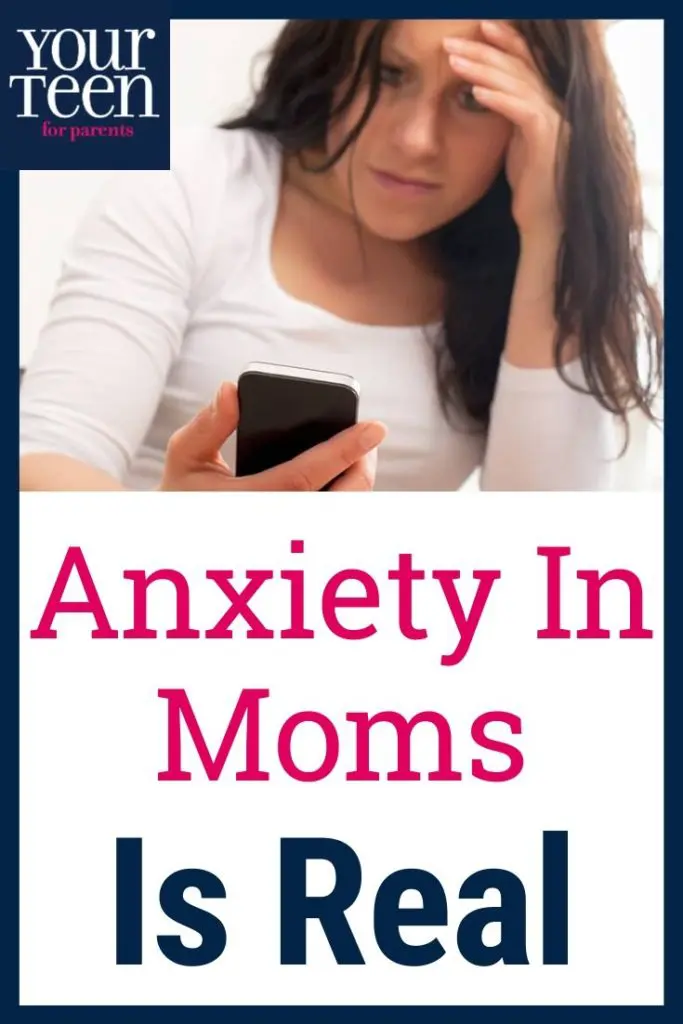More than ever, moms are feeling anxious. Here’s what you can do about it.

We know that in recent years a rising number of teens have been diagnosed with anxiety disorder. What may be less known is that many mothers also experience anxiety at some point in their lives. Your Teen spoke with Dr. Carly Crewe, a general practitioner in Alberta, Canada, and an online anxiety coach for women, about practical strategies for women to manage anxiety and stress.
Q: How can women recognize when they are experiencing anxiety?
Crewe: There already tends to be a stereotypical cultural norm of mothers as worriers, kind of frazzled and overwhelmed, but anxiety may not be something you recognize in yourself. Women might admit that they worry all the time; have a feeling of being keyed up, restless, unable to relax or just settle down and be still; or have an urgent need to be engaged in busyness. You may be irritable, have flashpoints of anger, or be short-tempered all the time. Many mothers say, “Of course, I’m exhausted and irritable—I have kids!” But at some level you can recognize that you weren’t always like this. All of these behaviors may be symptoms of an untreated anxiety disorder.
Q: Why do women experience anxiety?
Crewe: Anxiety and stress are really instinctual. They’re related to the fight-or-flight instinct, and it’s there to protect you and keep you vigilant and safe from threats. This instinct extends to our kids: A threat to your kids also threatens you and your identity as a mother. When your kids are hurt, you are hurt.
From a scientific point of view, these deep behavioral patterns are built into the brain. When our kids are small, we can control these external threats more effectively. We can control them physically to prevent them from running into the street or hurting themselves. This anxiety about controlling threats becomes a behavioral feedback loop: In effect, the brain learns, “I worried about this, and it worked to control the threat.” You do it with your child for 15 years, and it becomes a wired-in, habitual brain process that is hard to stop.
Q: What behaviors do women tend to exhibit that are associated with anxiety?
Crewe: As our kids enter into adolescence, problems and struggles become bigger and can have huge, life-altering consequences: pregnancy, drug use, jail. So, many women engage in what I call “buffering activities” to numb themselves from feeling anxious. [This could be] any kind of excessive behavior: overeating, overscrolling, drinking too much, overspending, anything that shuts the mind off and helps you to avoid dealing with this thing making you anxious. Helicopter parenting is another manifestation of this—there are few things more distressing than watching our kids suffer or struggle. We want to clear all the obstacles in front of them, to make sure they never make any mistakes and are never unhappy.
Q: Many women have teenagers at the same time they’re experiencing menopause. What impact does that have on anxiety?
Crewe: Menopause is a tumultuous time for many women, who may experience an increase in anxiety—whether it’s because of an imbalance between estrogen and progesterone or because of insomnia and sleep deficit. Sleeplessness is so often linked to anxiety. For anxious women, you have an overzealous threat-detection system. You have all these anxious thoughts during the day as the brain scans your environment for threats.
It doesn’t just settle down at night; the brain is still vigilant at night solving problems while you lie there trying to sleep. Sleep problems may include difficulty quieting a racing brain to be able to fall asleep; prolonged night wakings; hot flashes that wake you; or waking up very early. This becomes a cycle which prevents the restorative, consolidated sleep that your brain needs for memory retention—and to feel refreshed and renewed, and to cope with the anxiety. If your hormones are also imbalanced and you have a sleep deficit, combined with the challenges that come with having a teenager, it becomes a perfect storm.
Q: How can women cope with anxiety?
Crewe: Women need community, support, and dedicated mental health care. It’s important to find a care provider who listens and whom you can trust to make sure you get the help you need, which may mean seeing a therapist or taking medication. Women need to talk to someone and realize they are not alone in what they’re experiencing. They need self-care, by which I mean taking 10 to 30 minutes every day and actively, intentionally doing something to maintain your mental health.
Something you enjoy or that fulfills you, such as reading, doing a craft or hobby, meditating, or journaling. I really recommend keeping a journal in which you can track your moods and allow yourself to process and identify emotions, and to look ahead. For example, “I have this meeting next week; I’m probably going to feel anxious about this,” and to acknowledge it and take intentional action towards managing it. Our lives are so chaotic, so busy, so scheduled. It’s important to step out of all that to intentionally maintain your mental health and be mindful.
Q: What advice do you have for mothers of anxious teens?
Crewe: Anxiety can be a heritable condition—if you have anxious tendencies, your child may, too. Women who experience this can so often feel responsible and blame themselves for their child’s anxiety. Instead of feeling guilty, mothers instead should realize they are the perfect parent for their child because they can teach them how to deal with their anxious thoughts. You can really model positive coping strategies and an open mindset for your child if you work to learn these strategies for yourself.






